No products in the cart.

Generals Ibrahim Babangida and Sani Abacha epitomised the power dynamics within the Nigerian military elite, with one representing strategic charm and the other embodying sheer, unyielding force. Their complex relationship and contrasting styles ultimately shaped the trajectory of Nigerian politics in profound ways.
We do not know exactly when the political romance between Babangida and Abacha started. What we do know is that they were expert coup plotters who did not fail in a single one they participated in. Their friendship might have begun in mid-1966 while planning the brutal counter-coup that led to the overthrow and assassination of Major-General Johnson Aguiyi-Ironsi, Nigeria’s first military head of state and supreme commander. It could also be as late as the post-civil war era of the 1970s when the military entrenched themselves in Nigeria’s political sphere instead of the barracks. Nevertheless, Babangida and Abacha’s paths crossed because they were ranking officers of the Nigerian Army, during a period marked by political instability and military ambition.
Both men emerged in a period when Nigeria’s military saw itself not only as a defender of sovereignty but also as the judge of the nation’s political destiny. Babangida, famously charismatic and strategic, complemented Abacha, known for his stoic and steadfast loyalty. Early on, they found in each other a partnership rooted in shared ambition and a tactical alliance that would alter the course of Nigerian history.
Contents
Ibrahim Babangida
Ibrahim Babangida, often referred to as “IBB,” was born on August 17, 1941, in Minna, Niger State. A product of Nigeria’s early military academies, Babangida swiftly climbed the ranks in the Nigerian Army. Known for his strategic mind, charismatic personality, and deep understanding of military and political manoeuvres, Babangida played a critical role in several coups throughout the 1970s and 1980s. His ability to command loyalty and orchestrate high-level strategies earned him a reputation as one of the military’s most astute tacticians.

Babangida assumed the position of Nigeria’s Head of State following a coup on August 27, 1985, that ousted Major General Muhammadu Buhari. His regime, lasting until 1993, was marked by economic reform attempts, notably the introduction of the Structural Adjustment Programme (SAP), which aimed to diversify Nigeria’s economy and reduce its reliance on oil.
However, his tenure also saw significant political unrest, most notably the annulment of the June 12, 1993, election—a controversial decision that remains one of the most contentious events in Nigeria’s history. Known as the “Maradona” of Nigerian politics, Babangida’s capacity to outmanoeuvre rivals became the cornerstone of his political legacy.
Sani Abacha
Born on September 20, 1943, in Kano, Sani Abacha came from a conservative background and possessed a reputation for discipline and determination from a young age. Abacha’s military career began with rigorous training in Nigerian military academies, where he became known for his unwavering dedication and loyalty. His loyalty to the military hierarchy, paired with his ruthless approach to maintaining order, made him a dependable ally for any regime he served.
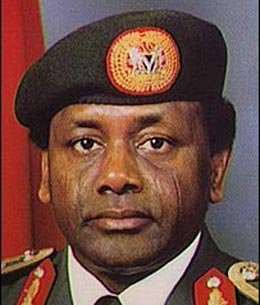
In 1993, Abacha seized power through a palace coup, establishing himself as Head of State. Unlike Babangida, who wielded his influence with a certain charm, Abacha’s rule was defined by repression and brutality. His administration was marked by systematic human rights abuses, censorship, and the imprisonment of political opponents. Despite his brutal rule, Abacha maintained a stronghold on Nigeria’s economy, amassing personal wealth while building a complex web of control over the country’s resources. His sudden death on June 8, 1998, ended one of the most repressive periods in Nigerian history, leaving behind a legacy of fear, oppression, and unresolved mysteries surrounding his financial dealings.
Rise Through the Ranks
Babangida and Abacha rose through the military ranks during the 1970s and early 1980s, a turbulent period in Nigerian history rife with coups and counter-coups. Babangida’s strategic brilliance became evident in his involvement in suppressing the February 13, 1976, abortive coup that tragically took the life of Head of State Murtala Mohammed. Abacha, meanwhile, made his name as a disciplined officer with an unparalleled sense of loyalty to the military hierarchy. The duo developed a reputation for effectiveness and ruthlessness, which propelled them to the upper echelons of the military command.
By the mid-1980s, Babangida and Abacha had solidified their alliance, and their eyes turned to the next phase of their ambitions: a plan to take over power from Major General Muhammadu Buhari, who had assumed leadership in a 1983 coup. Buhari’s regime was rigid, uncompromising, and unwaveringly focused on fighting corruption and disciplining the country. Yet his policies had alienated significant segments of the population and rankled within the military hierarchy.
In 1985, Babangida orchestrated a coup to remove Buhari from power, with Abacha as a key figure in the plot. The takeover was swift and decisive, marking the beginning of Babangida’s reign as Head of State with Abacha positioned as one of his most trusted allies.
Navigating Conspiracies and Surviving Coups
In December 1985, after just four months in power, Ibrahim Babangida faced his first serious challenge: the so-called “Vatsa Conspiracy.” Major-General Mamman Vatsa, a respected military officer and a childhood friend of Babangida, was implicated in a conspiracy against the Babangida regime. The alleged plot was said to involve a group of officers who were dissatisfied with Babangida’s leadership and aimed to overthrow him.
Babangida’s response to the conspiracy was swift and decisive. He established a military tribunal to investigate and prosecute the suspected plotters. Although there were doubts about the evidence against Vatsa, Babangida proceeded with the tribunal, which found Vatsa and several other officers guilty of treason and they were subsequently sentenced to death. Vatsa’s execution, along with other implicated officers, in March 1986, sent a clear message that dissent would not be tolerated.
Sani Abacha, a loyal ally of Babangida, played a critical role in both the investigation and the security crackdown that followed. Abacha’s involvement was instrumental in thwarting any further dissension and ensured the stability of Babangida’s government in the immediate aftermath. However, that would not deter some middle-ranking officers to destabilise Babangida again, four years after Vatsa’s execution and death.
The Gideon Orkar Coup Attempt of 1990
The Babangida regime faced an even more formidable threat in April 1990 when Major Gideon Orkar led a coup attempt that nearly toppled his regime. The Orkar coup was notable for its directness and brutality, as the conspirators attacked Dodan Barracks, Babangida’s official residence, in Lagos. Orkar and his cohorts aimed to overthrow Babangida and, in an unusual twist, declared their intent to “excise” certain northern states from Nigeria, reflecting deep-seated regional tensions within the military and the country at large.
The coup came dangerously close to succeeding, and Babangida’s survival was partly due to a fortunate series of events and Abacha’s loyalty. During the assault on Dodan Barracks, Babangida narrowly escaped capture, taking refuge in a fortified part of the barracks. Abacha, upon hearing of the coup, quickly mobilised loyal forces and led the counterattack that quashed the rebellion. His leadership in suppressing the coup was crucial, as he coordinated military operations that successfully retook key installations from the coup plotters.
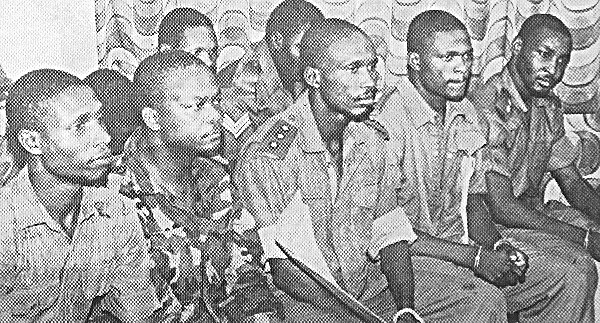
Abacha’s decisive actions in the face of danger not only saved Babangida’s regime but also further established his reputation as a stalwart protector of the military establishment. In the aftermath, Babangida cracked down on dissent within the military, reinforcing his grip on power and relying heavily on Abacha’s influence to maintain order.
In fact, the failure of the Gideon Orkar coup solidified Babangida and Abacha’s standing as a formidable duo and sealed the pact of friendship between them and Babangida made Abacha a full four-star General. It had never happened before in the history of Nigeria, for an active military officer to be a full General with an incumbent Head-of-State.
In the years that followed, Babangida and Abacha’s partnership was tested by various plots and conspiracies aimed at toppling their grip on power. Babangida’s government navigated internal military dissent, civil unrest, and external pressures. Despite this, Abacha’s loyalty remained steadfast, proving to be Babangida’s ultimate protector within the military. The two worked together to pre-empt potential threats, with Abacha often tasked with countering coup attempts. Their alliance grew stronger as they survived these challenges, and their joint tenure was defined by their ability to retain power against the odds.
The Annulment of the June 12 Election and Abacha’s Rise to Power
By 1993, Babangida had been in power for nearly eight years, following his 1985 coup against Muhammadu Buhari. Initially promising a transition to civilian rule, Babangida faced mounting internal and external pressures to deliver on his democratic commitments. After repeated delays and a protracted political transition programme, the regime called for a presidential election for the first time in nearly 10 years; a landmark event that represented the hopes of millions of Nigerians for democratic governance.
The height of the Babangida-Abacha era came with the June 12, 1993, election, regarded as Nigeria’s freest and fairest election up to that point. The election was between Moshood Kashimawo Olawale (M.K.O.) Abiola of the Social Democratic Party (SDP) and Bashir Tofa of the National Republican Convention (NRC).
As the election results began to emerge, it was clear that Abiola was on course for a landslide victory. However, just as the results were rolling in, allegations of irregularities and supposed threats to national security began to surface from within Babangida’s administration. Some senior military officers, particularly those from the northern regions, expressed concerns over Abiola’s potential presidency. Babangida, wary of alienating his military base and cautious about his own position, began to view Abiola’s likely victory as a potential threat to stability—or, more accurately, a threat to the established power structures that had kept him in office.
On June 23, 1993, the Babangida-led government, through a series of military and judicial manoeuvres, issued a decree that annulled the election. This decision, announced by the National Electoral Commission (NEC), halted the release of further election results, claiming that “irregularities” in the voting process and security risks necessitated the action. Babangida justified the annulment on national security grounds, suggesting that a transfer of power to Abiola could ignite ethnic and religious tensions. Critics, however, argued that the annulment was a calculated move to preserve the military’s influence over the country and protect Babangida’s interests.
In response to national and international backlash, Babangida attempted to justify the annulment by claiming that he was safeguarding Nigeria’s unity. He proposed a new Interim National Government (ING) as a temporary solution, with the expectation that this body would pave the way for eventual civilian rule. But this decision only further inflamed public opinion, leading to mass protests, civil disobedience, and violent clashes.
The backlash to the annulment was intense and far-reaching. Nigerians across the country, along with international organisations and foreign governments, condemned the annulment, calling for Babangida to reverse his decision. Faced with escalating protests and an increasingly untenable position, Babangida agreed to “step aside” on August 26, 1993, handing power to an Interim National Government (ING) led by Ernest Shonekan, a move widely perceived as a face-saving manoeuvre.
The appointment of Shonekan did little to restore stability. Just 82 days into his tenure, Abacha orchestrated a palace coup on November 17, 1993, positioning himself as Head of State. Unlike previous coups, which had involved overt military force, this takeover was bloodless and swift, underscoring Abacha’s ability to seize control with minimal resistance. Babangida, having stepped aside earlier, had effectively paved the way for Abacha to assume the ultimate position of power.
The next day, November 18, 1993, the new Head of State made his maiden broadcast to the nation and dissolved everything.
Please stay connected with us through our social media handles and make sure you are subscribed to our YouTube Channel. Together, let’s keep the stories of Nigeria’s past alive.
Leave a Reply
You must be logged in to post a comment.


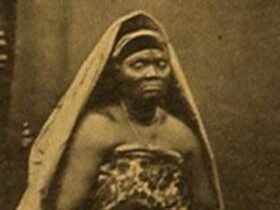
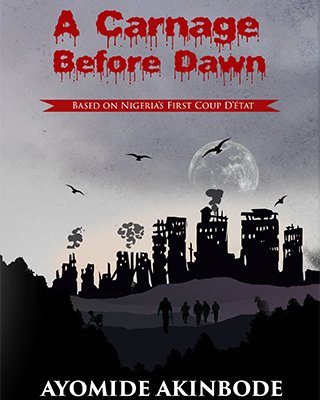

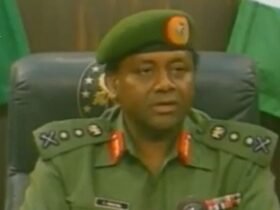


Leave a Reply
View Comments